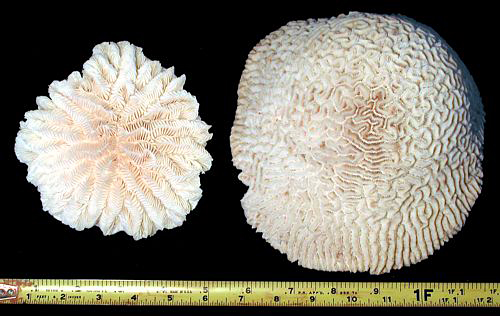

This page is still in the building process, but you're free to look while I'm working. I had these identified fairly well years ago, but lost the records somewhere along the line, so I'm re-doing it again. There are no sea shell reference books specific to the Panama area though, so I may end up identifying some shells incorrectly, and others may not get identified at all.
For an excellent sea shell reference web site, check out Hardy's Internet Guide to Marine Gastropods.
Left: Lamp Shell - Xancus angulatus, formerly Turbinella scolymus Gmelin - Found Jan 23rd, 1978 off the mainland parallel to the Three Sisters Islands, east of Portobelo.
Right: Pleuroploca Princeps - Found at Las Perlas Island in the Pacific Gulf of Panama, Nov 3rd, 1978. Similar in appearance to the Atlantic Horse Conch, but only half the size.
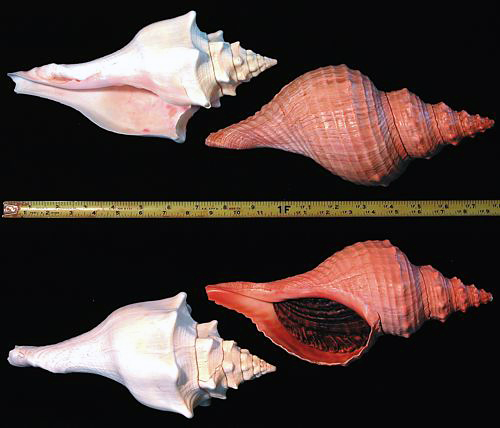
Left: Emperor Helmet - Found diving off the mainland across from Isla Grande Oct 22nd, 1978. This was a perfect specimen when it was found, but it's taken on a few chips through the years.
Right: King Helmet - Found snorkeling in the San Blas Islands, December 1978: one of my last shells found in Panama. This was a hard shell to clean up, but was worth the effort.
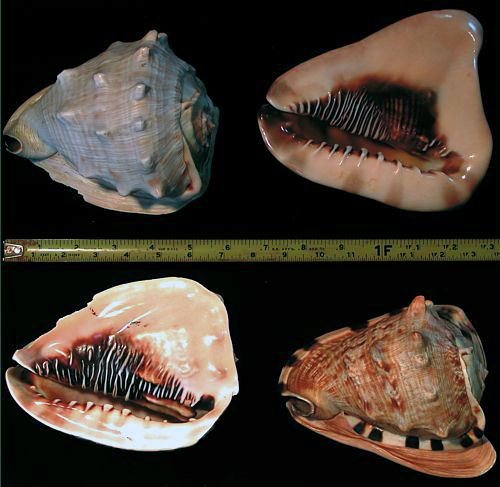
Left: Strombus Galeatus - Found in Las Perlas Islands in the Pacific Gulf of Panama, Nov 3rd or 4th, 1978. This was another hard shell to clean up, but turned out much better than I expected.
Right: Queen Stromb - This came from somewhere between the Portobelo area and the Three Sisters Islands along the Atlantic coast of Panama.
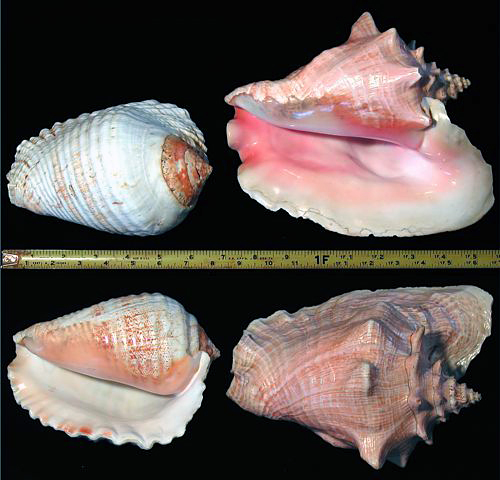
Left: Atlantic Triton's Trumpet or Pacific Triton's Trumpet - My memory of finding this on or near an Atlantic reef is extremely vague, and I could easily be wrong; especially since this looks so much like the Pacific Trumpet. With this doubt gnawing at me, I've decided to include links for both the Atlantic & Pacific Trumpet. It is, at least - without a doubt, a Trumpet.
Right: Peruvian Conch - Found snorkeling at Taboga Island, in the Pacific Gulf of Panama.
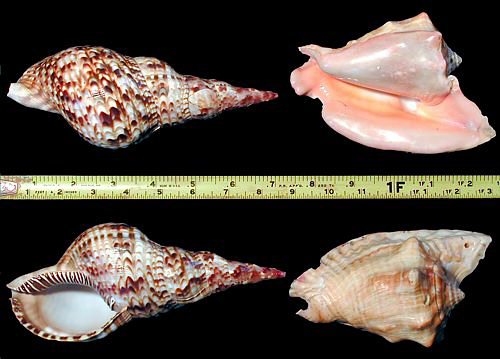
Left: Orange-Banded Cowry - This was found along the Pacific coast of Panama on a night low-tide beach sweep. The Pacific tide change in Panama was anywhere from about 15 to almost 20 feet between high and low tide. Once or twice a month though, there would be a unusually low tide due to the position of the moon and its gravitational pull, with the lowest tides occuring at night. We would follow the published tide tables closely, and hit the beach with flashlights looking for exposed shells that normally would not venture out of the water.
Right: Malea ringens - (Great) Grinning Tun This is another shell that I don't remember finding, but I'm pretty sure it was another find on a Pacific night low-tide beach sweep. NOTE: on the Atlantic coast of Panama, the tide difference was only a couple feet, so the low-tide beach sweep trick didn't work there.
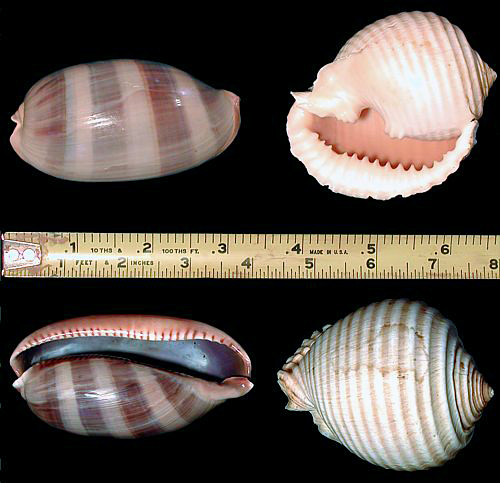
Left: Hawk Wing (Strombus Raninus Gmelin) - This came from the Atlantic side of Panama, but I can't remember enough about the dive to narrow it down any further. I'm not sure about the identification either; still working on it.
Right: Fighting Stromb - This is one of the prettiest shells I have, with its deep reddish-orange color. It came from just off the mainland parallel to the Three Sisters Islands, east along the Atlantic coast from Portobelo, Panama.
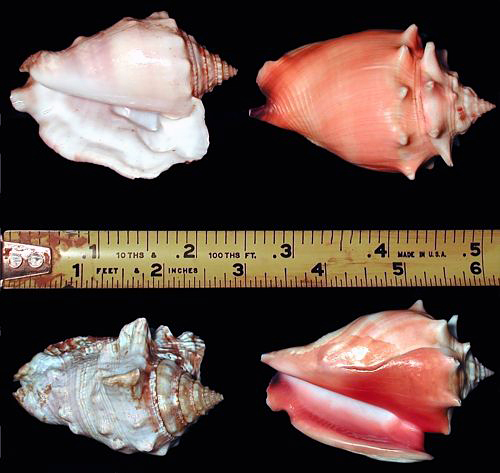
Left: Apple Murex - I can't remember where along the Atlantic coast of Panama I found this, but I remember finding it. It was so ugly and coated with crud, I laughed and almost left it behind; however, after a lot of hard work getting it cleaned up, I was really impressed with it.
Right: Melongena Patula - Yet another shell found on a night low-tide beach sweep along the Pacific coast of Panama.
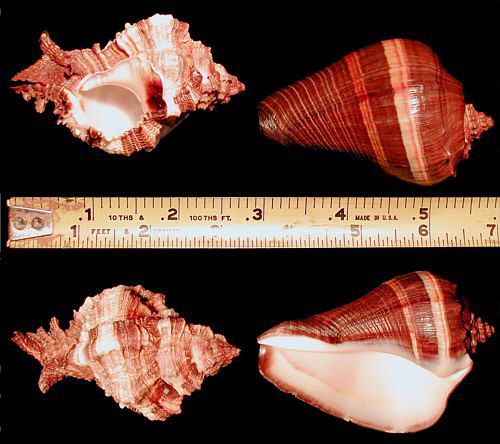
Center Left: Terebra Robusta (Robust Auger) - Probably found during one of our night low-tide beach sweeps on the Panama Pacific coast (see above for more info on our beach sweeps).
Center Right: Terebra Strigata - This was found diving off the coast of Taboga Island, in the Gulf of Panama, May 16th, 1978. We picked a poor spot for this dive, only 3 to 5 feet of visibility with nothing but an ugly sand bottom; however, you never know when you're going to run across a good shell, and this one made my day.
The upper right and lower left shell cuts were the result of a fun project I tried in the early or mid 1990's. Cutting a sea shell is not an easy task though. A standard hacksaw doesn't hardly scratch the surface. I had to use carbon tip blades to make the cuts, and even then, it was a lot of work.
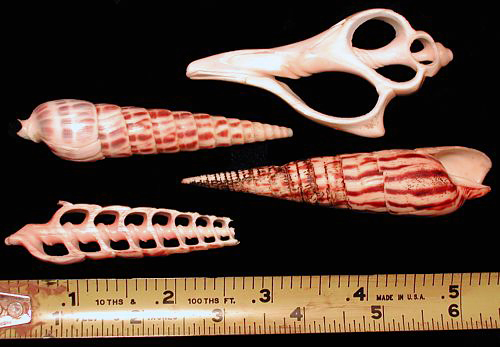
I haven't done any research on my coral yet, but the right piece is what we called brain coral. Both pieces are from the Atlantic coast of Panama somwhere in the Portobelo area up to the Three Sisters Islands.
